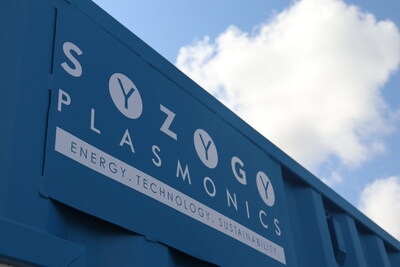
Syzygy Plasmonics and RTI International Sign Agreement to Demonstrate Sustainable Fuels Production System
Published by Todd Bush on January 24, 2023
Pilot project designed to utilize carbon dioxide and methane to produce low-carbon-intensity fuels gains sponsorship from Equinor Ventures and Sumitomo Corporation of Americas
HOUSTON, Jan. 24, 2023 /PRNewswire/ -- Syzygy Plasmonics, a deep decarbonization company, announced an agreement today with the nonprofit research institute RTI International to demonstrate sustainable fuel production at the RTI facility in Research Triangle Park, North Carolina, USA. The new technology has the potential to help decarbonize transportation by converting two potent greenhouse gases, carbon dioxide (CO2) and methane (CH4), into low-carbon-intensity fuels that can be used to replace petroleum-based jet fuel, diesel, and gasoline. The pilot project is being sponsored by Equinor Ventures and Sumitomo Corporation of Americas.

Syzygy Plasmonics logo on an electrified photocatalytic reactor container.

This sustainable fuels demonstration project combines all-electric chemical reactors from Syzygy with the proven Fischer-Tropsch capabilities of RTI International.
>> In Other News: Air Liquide and Sasol Sign First Long-term Contracts for Supply of Renewable Energy to the Secunda Site
Testing is planned for a period of six months, with results from the demonstration to be used to build a technoeconomic analysis for constructing a commercial-scale Syzygy e-fuels plant.
"This demonstration will be the first of its kind and represents a disruptive step in carbon utilization. The sustainable fuels produced are expected to quickly achieve cost parity with today's fossil fuels," said Syzygy CEO Trevor Best. "Integrating our technology with RTI's Fischer-Tropsch synthesis system has the potential to significantly reduce the carbon intensity of shipping, trucking, and aviation without requiring major fleet modifications. By making minor adjustments in the process, we also expect to produce sustainable methanol using the same technology."
The solution uses a fully electrified reactor provided by Syzygy to produce syngas from CO2 and CH4 in a dry methane reforming (DMR) reaction. The syngas is then processed through a Fischer-Tropsch (FT) synthesis unit to make various fuel grades. The potential of this technology to reduce carbon intensity in fuel could give transportation companies and airlines an affordable solution for cutting emissions and reducing their carbon footprint.
"We are excited about the opportunity to collaborate with Syzygy to test and assist in the scale-up of this promising technology," said Sameer Parvathikar, Ph.D., the director of the Renewable Energy and Energy Storage program in RTI's Technology Advancement and Commercialization business unit. "This work aligns with our capabilities, our goals of helping de-risk and commercialize novel technologies, and our vision to address the world's most critical problems with science-based solutions."
Having already proven its scale-up capabilities in earlier testing of its FT synthesis unit, RTI is assisting Syzygy with process design and systems integration for this pilot-scale demonstration. The full production pathway at the pilot scale includes multiple electrified DMR reactors that will consume 27 tons of CO2 per year and produce 6,100 gallons of e-fuels. At commercial-scale this technology is expected to utilize millions of tons of CO2 per year to produce sustainable fuels.
About Syzygy Plasmonics
Syzygy Plasmonics is a deep-decarbonization company. It builds reactors that use light instead of heat to electrify chemical manufacturing and power a cleaner, safer world. Utilizing technology licensed from Rice University and advanced engineering, Syzygy is commercializing a universal photocatalytic reactor platform. When powered with renewable electricity, this tunable technology reduces both cost and emissions from many different chemical reactions. For more information visit plasmonics.tech.
About RTI International
RTI International is an independent, nonprofit research institute dedicated to improving the human condition. Clients rely on us to answer questions that demand an objective and multidisciplinary approach—one that integrates expertise across the social and laboratory sciences, engineering, and international development. We believe in the promise of science, and we are inspired every day to deliver on that promise for the good of people, communities, and businesses around the world. For more information visit www.rti.org.
SOURCE Syzygy Plasmonics
Subscribe to the newsletter
Daily decarbonization data and news delivered to your inbox
Follow the money flow of climate, technology, and energy investments to uncover new opportunities and jobs.
Companies
Latest issues
-
This Saskatchewan Well Just Made Hydrogen History
Inside This Issue 🛢️ This Saskatchewan Well Just Made Hydrogen History ⚡ Plug Power Completes Installation of 100 MW GenEco Electrolyzer Units at Galp’s Sines Refinery 🧪 SaltX Receives a $1.5 Mill...
-
Shell’s Canada CCS Bet: 650,000 Tons Annually
Inside This Issue 🏭 Shell To Build Carbon Capture And Storage Projects In Canada 🧪 Vortex Energy Highlights 2025 Technical Milestones Across Project Portfolio And Announces Adjournment Of AGM To F...
-
Three Industry Giants Just Aligned on Ammonia
Inside This Issue ⚓ CF Industries, Trafigura And TFG Marine Sign MOU To Advance Low-Carbon Ammonia For Maritime Decarbonisation 🌽 EPA Expects to Finalize 2026-27 Biofuel Blending Rules in Q1 2026 ...
Company Announcements
-
SaltX Technology (https://www.saltxtechnology.com), a leader in electrified high-temperature industrial processing, today announced the launch of its Multi-Plasma Upgrade Project. This major initia...
-
Frontier Selects Leilac To Develop Zero Carbon Lime Solution
Frontier, an advance market commitment to accelerate permanent carbon removal, announced today that it awarded an R&D grant to Leilac, a Calix subsidiary, to support the production of zero carb...
-
Plug Power Completes Installation of 100 MW GenEco Electrolyzer Units at Galp’s Sines Refinery
SLINGERLANDS, N.Y., Jan. 23, 2026 (GLOBE NEWSWIRE) -- Plug Power Inc. (NASDAQ: PLUG), a global leader in comprehensive hydrogen solutions for the hydrogen economy, today announced the successful co...
-
Hydrexia To Provide Hydrogen Application Solution To Toyota
SIDNEY, Jan. 22, 2026 /PRNewswire/ -- Hydrexia Pty Ltd, the wholly owned subsidiary of Hydrexia Holding Limited, a leading hydrogen technology solution provider, announced today that it has secured...